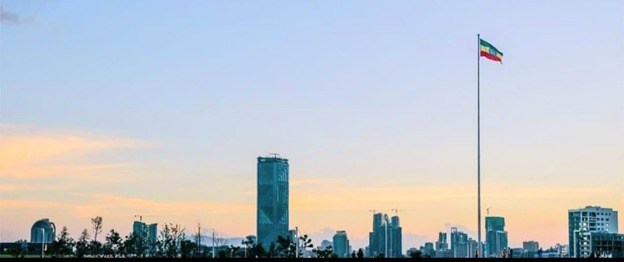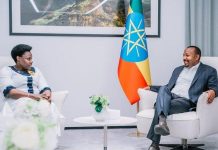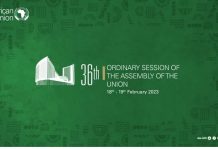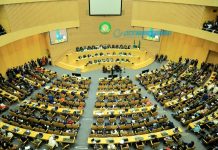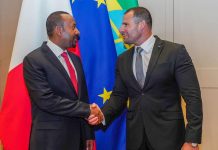Africa-Press-Ethiopia
Ethiopia has shifted its focus towards its main agenda of continuing its reform process, while at the same time re-building the region of Tigray.
A group of reformists led by Dr. Abiy Ahmed came to the helm of power in April 2018, ushering in a new era of political and economic liberalization and opening up, amidst growing grievances about political, economic, and social inequality.
On the political front, crucial measures of reform have been taken to set a stage for long term political solutions to peoples’ grievances and demands. Right at the beginning of the reform process, tens of thousands of prisoners were released while political opponents both at home and abroad that were prohibited to practice politics in the country were allowed to join the democratization process. Repressive laws such as the Anti-terror Law and the Civil Societies Organizations Law that undermined the human and democratic rights of citizens were reformed.
Furthermore, institutions that are considered as the pillars of democracy such as the Election Board, the Human Rights Commission and the justice system went through extensive reforms to ensure the well-functioning of the institutions and independence in carrying out their constitutional mandates.
In the economic front, even if Ethiopia had been registering double-digit economic growth for a decade and half, unemployment, high inflation rate, as well as growing income disparity have been the Achilles-heel of the Ethiopian economy, causing severe macro-economic imbalances and debt stress. Thus, the economic reform emphasis is among others, on reducing youth unemployment, creating a favorable environment for the private sector as well as addressing structural challenges to the economy.
To this end, a Homegrown Economic Reform agenda was drawn which led to the newly unveiled 10-year economic growth plan (2020/21-2029/30). The plan envisages to sustain the country’s high growth trajectory and position Ethiopia as an African Beacon of Prosperity. The economic reform has achieved commendable results by restructuring the debt burden, inviting the private sector to have a strong role in the economy and adding to the focus of the economy sectors such as ICT, tourism, and mining.
In our sub region, the new leadership rekindled the already strong role that Ethiopia played in the Horn of Africa. In this regard, the Prime Minister’s initiative to end the two decades old “no-war, no-peace” situation with Eritrea has received paramount global applause and recognition due to its significant effect on the stabilization of the region. The world honored the Prime Minister’s initiative by crowning him with the most prestigious global award, the Nobel Peace Prize in 2019.
It goes without saying that for any reform process to succeed, it will require the active participation of key political, economic, and social actors in particular and the entire populace. It was in light of this fact that the new administration invited all political actors, civil societies, media organizations as well as every citizen to contribute their fair share in the process of reforming Ethiopia towards a democratically stable and prosperous state.
Challenges and opportunities
However, the reform process was not a smooth ride. Frequent challenges were posed by some groups abusing the widely opened democratic process, advocating for ultranationalism, and creating superficial inter-communal strife.
One can also clearly discern how these groups that have lost the monopoly of power such as the TPLF leadership have become a stumbling block to the reform by instigating instability and hampering political dialogue.
Since the start of the reform process, the Federal Government has been patient towards the transgression that has been perpetrated by some groups including the TPLF leaders. All the peaceful options availed for the TPLF leadership to engage in the reform process were rejected. However, the TPLF group remained intransigent to any form of dialogue and negotiations. Instead, it opted to continue destabilizing Ethiopia, by training and financing various armed groups as well as directly executing attacks in various parts of the country.
Furthermore, the group was determined to oppose any decision from the Federal Government institutions, including the postponement of the 6th General Election, in light of the looming COVID-19 pandemic. The group rather opted to hold illegal regional elections and declared the Federal Government illegitimate.
The climax to this intransigence came in the early morning of November 4, 2020, when the criminal clique attacked the Ethiopian National Defense Forces that have been stationed in Tigray region since the end of the war between Ethiopia and Eritrea in 2000. Only then the Government ordered the Federal Defense Forces to defend themselves by all necessary means and restore law and order in the country. The main objectives of the law enforcement operation were to bring the perpetrators of this heinous attack to justice, to set free the military generals and officers taken hostage by the group, and to restore peace and stability to the region.
Now that the operation is finalized within a short period of time, the Government of Ethiopia has shifted its focus towards its main agenda of continuing its reform process, while at the same time re-building the region of Tigray.
The Government of Ethiopia is bringing the reform back on track by, among others, readying the nation for a national democratic election. The Election Board of Ethiopia has already announced the new date for national and regional election to take place in early June 2021. It is expected to be the most competitive and democratic election that the country has ever witnessed in its history. The European Union’s Election Observation Mission is also expected to observe these historic elections in Ethiopia.
Building democratic institutions and democratic culture certainly takes time; it also requires tireless and dedicated efforts. At this stage, the government has been able to lay down the basis for greater respect for human rights and better standards of governance in Ethiopia. The determination to conduct the upcoming national election is none other than a clear demonstration of this fact. For this to take roots, it requires the dedication of all political actors in Ethiopia.
Gebru connected with VICE World News from an undisclosed location along the Ethiopian-Sudanese border, and said that there was no sign of war or even resistance fighters present when, on January 10, Eritrean soldiers arrived in his village and went on a murderous rampage, pillaging and setting homes alight. “They shot at everyone, they even killed priests who were hiding in the church,” he said. Gebru also said that he heard about neighboring villages experiencing similar destruction that has also gone unreported.
“They shot at everyone, they even killed priests who were hiding in the church.”
Over the past month, VICE World News has documented harrowing testimony from nine displaced Tigrayans who recalled wanton slaughter, the destruction of crops and livelihoods, and tens of thousands fleeing from areas of Ethiopia’s Tigray region under Eritrean military control. Their testimony has been largely confirmed by satellite image analysis by the U.K.-based research organization DX Open Network, and their recounting and the image analysis both suggest that Eritrean soldiers involved in Ethiopia’s war in Tigray are ethnically cleansing communities near the Ethiopian-Eritrean border.
While several towns in the area have been previously reported destroyed, VICE World News found that, at minimum, an additional four villages in Tigray have likely been razed, and their inhabitants killed.
Eritrean soldiers first entered Ethiopia’s civil war to fight alongside the Ethiopian army against forces of Tigrayan People’s Liberation Front, known as TPLF, or the governing party in the region. In November, soldiers from the two countries succeeded in jointly pushing out Tigrayan forces from the regional capital, Mekelle, and have been accused by international organizations like Amnesty International and Human Rights Watch of brutal war crimes and indiscriminate shelling that targeted civilians and is believed to have left thousands dead.
Residents say that though Ethiopian prime minister Abiy Ahmed declared victory and the end of combat operations, Eritrean military units have continued attacking civilian areas, looting and killing before setting properties ablaze to render entire areas uninhabitable.
Now, Ethiopia claims it is conducting clean-up operations across parts of rural Tigray. Satellite imagery from central Tigray’s Eritrean border, however, points to something far more nefarious.
Like Debre Harmaz, the remote farming community of Adi Mendi, located three miles from Ethiopia’s border, also appears to have been destroyed. According to analysis by the DX Open Network, satellite imagery revealed that on January 19, some 478 structures, mostly tukul homes made from compressed straw, grass and mud, were set on fire. Tukul homes are common in farming communities across Ethiopia.
“Many of them were burnt alive in their homes.”
“Absence of scorching between blackened structures suggests intentional burning, not the result of a wildfire,” the DX Open Network said of the images in a statement to VICE World News. “Perpetrators likely went from structure to structure to initiate razing. And furthermore, there were no apparent indicators of any militarily valid targets.”
“Many of them were burnt alive in their homes,” said Adamu Gidey, who hails from the nearby town of Rama and is well acquainted with the border areas. “I’ve met with survivors, who told me that the Adi Mendi is now a ghost town. Farmers were forced by Eritrean soldiers to slaughter their cows and prepare food for the soldiers. They later doused the homes of these same farmers in gasoline. Adi Mendi no longer exists.”
The satellite images of the visible scorched aftermath point to possibly thousands of people being rendered homeless or far worse.
“The people of Adi Mendi were farmers who would go once a month on hours-long treks to nearby areas to sell their produce, as there are no paved roads for vehicles,” said Gidey, whose name has been changed to protect his safety. “They didn’t deserve this cruelty.”
The DX Open Network’s analysis also confirmed that in recent weeks, the razing has begun to expand beyond central Tigray. The village of Ademeyti, located just south of the long contested town of Badme, and flashpoint of the 1998-2000 Ethiopian-Eritrean border war, was similarly ransacked, with homes set on fire as recently as February 16. DX Open Network shared satellite imagery of Ademeyti’s ruins with VICE World News.
While much of the war was fought under a communications blackout, as phone and internet services were severed from the entire area and aid workers and journalists were not allowed into the region, multiple reports this past week have echoed similar findings of ethnic cleansing and indiscriminate destruction. Yesterday, the New York Times published portions of a U.S. government report which stated that ethnic cleansing was rampant in northern Tigray. According to the report, “whole villages were severely damaged or completely erased.”

